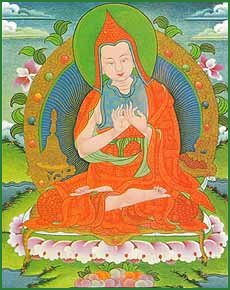The Great Chariot
by Longchenpa | 268,580 words
A Commentary on Great Perfection: The Nature of Mind, Easer of Weariness In Sanskrit the title is ‘Mahāsandhi-cittā-visranta-vṛtti-mahāratha-nāma’. In Tibetan ‘rDzogs pa chen po sems nyid ngal gso’i shing rta chen po shes bya ba ’...
Part 7 - Like the external, the inner is impermanent
For these reasons, one's own mind is even more perishable than an ancient ruined city:
Sentient beings, like a bower gathered from the four elements,
Are ornamented with moving thoughts, like people inside.
Their composite elements rise from conditions and are destroyed.
Since all is impermanent, like an ancient city,
Let us quickly perform the actions of holy Dharma.
That is the exhortation. Ruined cities that are now abandoned were once well-constructed and filled with many beings. Later they became vacant. Think of their lives like this:
“Kye ma'o! Only discarded artifacts are left of the former worldly qualities of youth and wealth of these beings. Of the people themselves, only the names endure.”
Like this example, our bodies, these bowers collected from the four elements, are now beautified with clothing and ornaments. Though these people that emanated various discursive thoughts also adorned their bodies like that, they were destroyed, and only the bones are left. So later people calling my bones by my name will say,
“Those are his bones.”
"That's how it is," we should think from our hearts. The Friendly Letter says:
As we reach the finish of the body, it withers and finally falls. At last its foul essence is not there at all. It is worn out, decomposes, and is completely destroyed. Know that its elements will be torn asunder.
